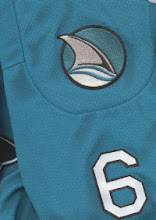Monday, February 4, 2008
The Problem With the All-Star Game
I dislike all-star games. All of these ersatz contests are fundamentally flawed in that they mean nothing or next to nothing (to my knowledge, only the outcome of Major League Baseball's all-star game has any actual significance whatsoever), and consequently are sapped of any competitive spirit. Sure, it's possible to enjoy the rare and amazing skills of an athlete who is participating in an exhibition, whether that athlete be a point guard or a figure skater, but without the sense that something is at stake, that the outcome is being hotly disputed by the competitors, there isn't the sense of participation in a drama that I believe is the core emotion of the sports fan.
This lack of meaning harms ice hockey more than the other major North American team sports. Baseball probably does the best under all-star conditions--the duel between pitcher and batter is central to the sport, and probably does not lose much for taking place in the course of an exhibition, and the last time I checked the representative of the league winning the All-Star Game gets home field advantage during the World Series. (Although it's worth pointing out that one of the most infamous moments in the history of all-star games--Pete Rose's clobbering of Ray Fosse--occurred during baseball's version of the event). The NBA's all-star game tends, like hockey's, to be absurdly high-scoring, but basketball is a high-scoring game to begin with, and something about a bunch of phenomenally talented hoops players running-and-gunning playground style just seems kinda right. The Pro Bowl, taking place after the season, is probably the most anticlimactic of the set, but it still bears at least some resemblance to a typical scrimmage football game, because the sport literally cannot exist without blocking and tackling, so even in the Pro Bowl, guys get blocked and tackled. And the fact that it takes place after all the real games are over at least means that anyone who gets banged up has plenty of time to get well before his team needs him again.
Like scrimmage football, ice hockey is an extremely physical and sometimes perilous contact sport. Unlike scrimmage football, however, ice hockey can exist--sort of--without a great deal of physical contact. And so, in the NHL All-Star Game, it does. Players who are just embarking upon the drive to the playoffs--and who night after night during the regular season expose themselves to all manner of athletic violence and peril in pursuit of victory--would prefer (quite reasonably) not to suffer a concussion/broken bone/sprained ankle/pick your trauma in a meaningless exhibition game, thank you very much, and consequently the game is, by mutual consent, a no-checking, no-defense affair (much to the relief of coaches and general managers across the league, I'm quite sure).
If someone from NHL HQ were to comment upon the preceding, I am sure they would say that the All-Star Game is a valuable opportunity to sell the sport, and that any risks incurred are worthwhile, serving the greater good of the league as a whole.
The problem is that the sport of ice hockey, as displayed during the All-Star Game, only vaguely resembles the sport as it is played during meaningful NHL games. The guts, passion, and intensity that makes the sport so great in the eyes of those who love it is absent. I find little appealing about the All-Star Game and usually don't watch it (I didn't this year), and I suspect many if not most other old-fashioned hockey fans feel the same way. And for those who are new to the sport, what are we selling them? We hold up an 8-7, defense-less goalfest, but should any of those to whom we are trying to market the league's product decide to check out a regular season game, they are as likely as not to see a close-checking 2-1 game (unless their local team is in the Southeast Division, which is generally defense-less, anyway). It's a little like holding up this and delivering this (or vice versa). And no, I'm not looking to get into the issue of whether higher-scoring = better, and I'm not making any kind of judgment about whether the MISL or the English Premier League version of soccer is superior...I'm just saying that the product on display during the All-Star Game and the product on display during the rest of the season are two very different things, and this would seem to work against the game's utility in selling the sport.
Thus endeth my dissertation on why I think the NHL All-Star Game needs to be replaced. In my next post, I'll set forth a proposal for an alternative mid-season event that not only involves some meaningful hockey in what I think would be a very enjoyable format for fans, but also addresses another oft-heard criticism about the NHL. Stay tuned.
Subscribe to:
Post Comments (Atom)

No comments:
Post a Comment